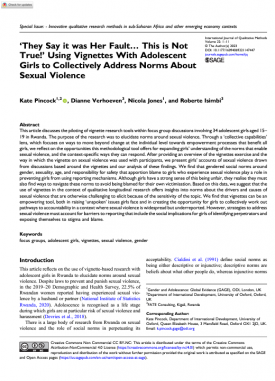Sexual and reproductive health is recognised as integral to the wellbeing and rights of women and girls, both at the global level and in Ethiopia, yet significant work remains to improve outcomes for the most marginalised young people. Young women involved in sex work in Ethiopia are at particular risk of sexual exploitation, abuse and transmission of HIV and STIs, whilst facing barriers to accessing SRH services. This policy brief draws on implementation research funded by WHO and carried out by the Gender and Adolescence: Global Evidence (GAGE) programme into the effectiveness of an intervention to provide training to young women involved in sex work on topics related to sexual and reproductive health and life skills. Findings are presented on the experiences of young women involved in sex work, the impact of the training they received, and programme limitations. Key recommendations for both policy and programming are identified.
Suggested citation:
Pincock, K., Yadete, W., Workneh, F., Murha, R., Tilahun, K., Gebeyehu, Y. and Jones, N. (2023) ‘Young women involved in commercial sex work in urban Ethiopia: experiences, drivers and implications for sexual and reproductive health policy and programming.’ Policy brief. London: Gender and Adolescence: Global Evidence (https://www.gage.odi.org/publication/young-women-involved-in-commercial-sex-work-in-urban-ethiopia-experiences-drivers-and-implications-for-sexual-and-reproductive-health-policy-and-programming/)

